Subversive Sisters: A Herstory of Our Foremothers
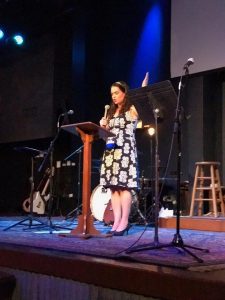
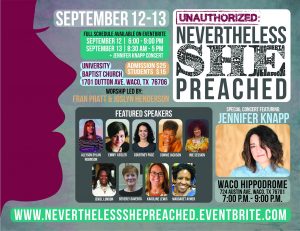
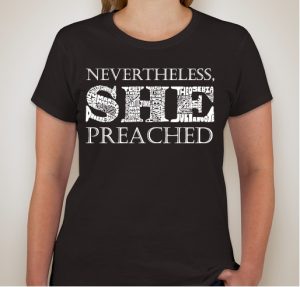 “Unauthorized: Nevertheless, She Preached” exceeded all expectations of organizers Rev. Kyndall Rae Rothaus and Rev. Natalie Webb. They launched a facebook page with a really cool logo and t-shirt, designed by artist Rev. Heather Mooney, and within a few days they had the conference fully funded. They raised enough money to bring amazing speakers, including Rev. Dr. Courtney Pace, church history professor from Memphis Theological Seminary and board member of the national, ecumenical Equity for Women in the Church.
“Unauthorized: Nevertheless, She Preached” exceeded all expectations of organizers Rev. Kyndall Rae Rothaus and Rev. Natalie Webb. They launched a facebook page with a really cool logo and t-shirt, designed by artist Rev. Heather Mooney, and within a few days they had the conference fully funded. They raised enough money to bring amazing speakers, including Rev. Dr. Courtney Pace, church history professor from Memphis Theological Seminary and board member of the national, ecumenical Equity for Women in the Church.
Rev. Dr. Courtney Pace gave a compelling presentation titled “Subversive Sisters: A Herstory of Our Foremothers.” She began by supporting her statement that “patriarchy is at the root of every systemic evil, including slavery, racism, sexism, classism, heterosexism, and every other form of oppression.”
Nevertheless—in spite of patriarchal oppression women down through the centuries have answered God’s call to preach, teach, write, and lead in ministry. Rev. Dr. Pace drew from diaries, journals, and other publications to reclaim and celebrate the stories of some of these “subversive sisters.” She challenged us also to publish in order to “establish our voices in unerasable form.”
It was inspiring to hear about these faith-filled foremothers who courageously resisted, persisted, preached, and advocated.
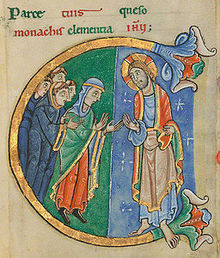
Christina of Markyate (c.1097- c.1155): She had deep faith from the time she was a child and made a private vow of chastity. Her mother arranged for her to be raped so she would have to marry. But she dressed herself as a man to escape. She became an anchoress and Prioress of St. Albans Abbey at Markyate in England.
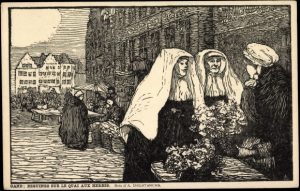
Beguines (13th-14th centuries): These religiously dedicated laywomen lived together in simplicity, chastity, and prayer. They were financially independent, so their own visions were unregulated by ecclesiastical authorities. They described the Divine in female names and images, and questioned gender norms.
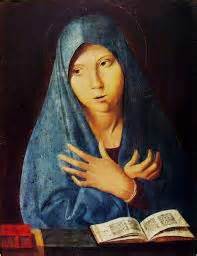
Marguerite Porete (1250-1310): She was a French mystic, believed by historians to have been associated with the Beguines. She authored The Mirror of Simple Souls, in which she espoused the centrality of divine love. Refusing to remove her book from circulation or recant her views, she was jailed as a heretic and then burned at the stake.
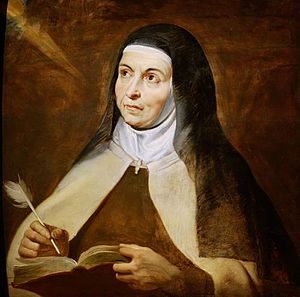
Teresa of Avila (1515-1582): Spanish mystic and Carmelite nun, she worked within the system to change it. She was a reformer in the Carmelite Order and taught contemplation and active charity. Her theological works include The Interior Castle. She had to defend what she wrote against power plays to discredit her work, but she was finally canonized in 1989.
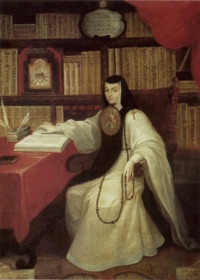
Sor Juana Ines De La Cruz (1651-1695): A Hieronymite nun during Mexico’s colonial period, she became a nun so she could study and write. She critiqued male leaders as not being true to biblical texts. In her convent cell, she amassed one of the largest private libraries in the New World. She criticized the misogyny of church leaders who taught that women shouldn’t write theology, and she was silenced and forced to divest herself of her library.
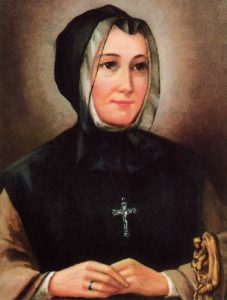
Marguerite d’Youville (1701-1771): A French Canadian widow, she founded the Order of Sisters of Charity of Montreal. She established and directed a hospital and an orphanage. She was called a heretic because she would help anyone, but she was finally canonized in 1990.
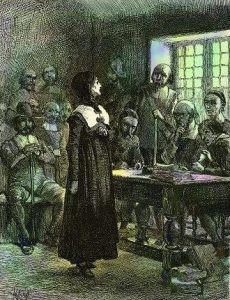
Anne Hutchinson (1591-1643): A Puritan charismatic teacher, she drew large crowds of women and men to her meetings. Religious leaders accused her of heresy because she claimed grace to be separate from works, but they were really objecting to her gender, believing that she shouldn’t be teaching men. Also accused of witchcraft, she was tried and banished from Massachusetts Bay Colony.
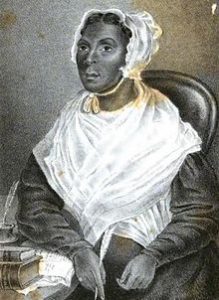
Jarena Lee (1783-1864): She walked thousands of miles on her itinerant preaching tours. When she was first called to preach, she told the founder of the African Methodist Episcopal Church, Richard Allen, but he refused to let her preach because she was a woman. Later she became the first woman authorized to preach by Allen, but she continued to face hostility to her preaching because of her race and gender. She was the first African American woman to have an autobiography published in the United States. She was not ordained in the AME denomination until posthumously in 2016.
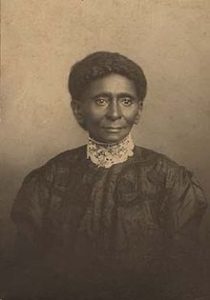
Maria Fearing (1838-1937): Born a slave in Alabama, she learned to read and write when she was freed and went on to graduate from Freedman’s Bureau School. She became a successful teacher and then a Presbyterian missionary. Failing to get support from the denomination, she financed her own mission work in the Congo as a teacher and Bible translator for twenty years. She became known as “Mother from far away.”
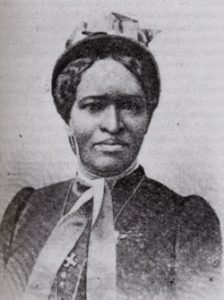
Lucy Farrow (1851-1911): Born into slavery in Virginia, she became a prominent holiness pastor. In spite of experiencing prejudice and injustice, she became an important voice in Pentecostalism and sparked a revival in Los Angeles that spread across the world. She was the first African American to be recorded as having spoken in tongues. She helped others receive the Holy Spirit and the gift of glossalalia. On a preaching tour to Liberia, she continued her powerful ministry.
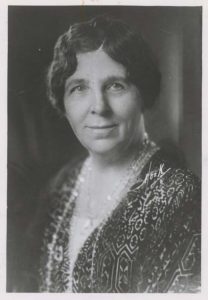
Helen Barrett Montgomery (1861-1934): In 1921, she was elected as the first woman president of the Northern Baptist Convention, the first woman to become president of any religious denomination in the United States. A social reformer, educator, and writer, she was the first woman scholar to publish a translation of the New Testament. She helped women in the United States become aware of unjust conditions of women around the world.
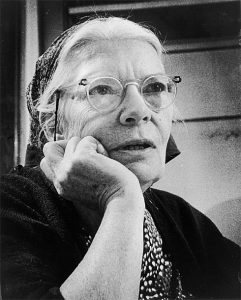
Dorothy Day (1897-1980): Journalist and social activist, she co-founded the Catholic Worker Movement to combine direct aid for the poor and nonviolent activism on their behalf. She was also an activist in the pacifist and women’s suffrage movements. Practicing civil disobedience, she was imprisoned for her women’s suffrage activism and arrested many times when advocating for other social justice causes. She has been considered for canonization, but some have objected because she wasn’t a virgin.
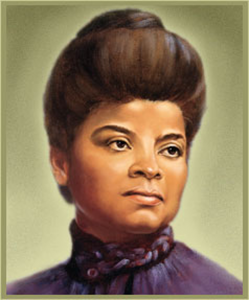
Ida B. Wells-Barnett (1862-1931): Born a slave in Mississippi, she became an early leader in the Civil Rights Movement. She was one of the founders of the National Association for the Advancement of Colored People (NAACP). A journalist, she led an anti-lynching crusade through her writing and was active in the women’s rights and women’s suffrage movements. She criticized the temperance movement for not letting black women participate. Her work contributed to waking Southerners’ conscience about race.
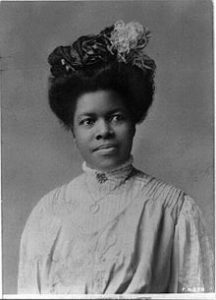
Nannie Helen Burroughs (1879-1961): An educator, religious leader, and social justice activist, she founded in 1909 the National Training School for Women and Girls in Washington, DC, the first school in the nation to provide vocational training for African American females who otherwise had few educational opportunities. An activist for wage equality and women’s equality, she gave a speech titled “How the Sisters Are Hindered from Helping,” at the 1900 National Baptist Convention.

Prathia Hall (1940-2002): Civil Rights Movement leader and womanist theologian, she was one of the first African American women ordained by the American Baptist Churches in the U.S.A. Courageous in civil rights activism, she was arrested many times, shot at, wounded, and jailed for weeks. Nevertheless, she persisted. Nevertheless, she preached. Active in the Student Nonviolent Coordinating Committee (SNCC), she was head of the Selma Project and the Atlanta Project, training many Northern white college students. Her repetition of “I have a dream” in a public prayer inspired Martin Luther King Jr.’s famous speech. She spoke with such power that MLK once remarked, “Prathia Hall is one speaker I prefer not to follow.” For many years Rev. Dr. Courtney Pace has been researching and writing about Rev. Dr. Prathia Hall and is currently completing a book on her. In an article Courtney writes: “Little did I know at the beginning of this journey that Prathia would become a spiritual mother to me, a ‘shero’ who continues to inspire me about the real meaning of life and faith.”
After presenting this stirring “herstory of our foremothers,” Rev. Dr. Pace left us with this challenge: “What will young people see in us? I want to leave a legacy of bold resistance and persistence for social justice.”
I’m familiar with a lot of these women. The only thing I would have added is Ida B Wells published a newspaper out of the basement of First Baptist Church Beale Street, Memphis.
Thank you, Mary Alice, for this adding to this profile of Ida B. Wells.
THIS IS SOOOOO GOOD!! I HADN’T heard of most of these women but sure needed to! How inspiring. Do you mind if I share this on my blog sometime?
p.s. I read somewhere that ROSES symbolize an awakened heart. @)>——
Thank you, Colette! Yes, I would be delighted for you to share this on your blog, FREE SOPHIA! http://www.freesophia.com/
You’ve been using the ROSE symbol for many years, and now I know why.